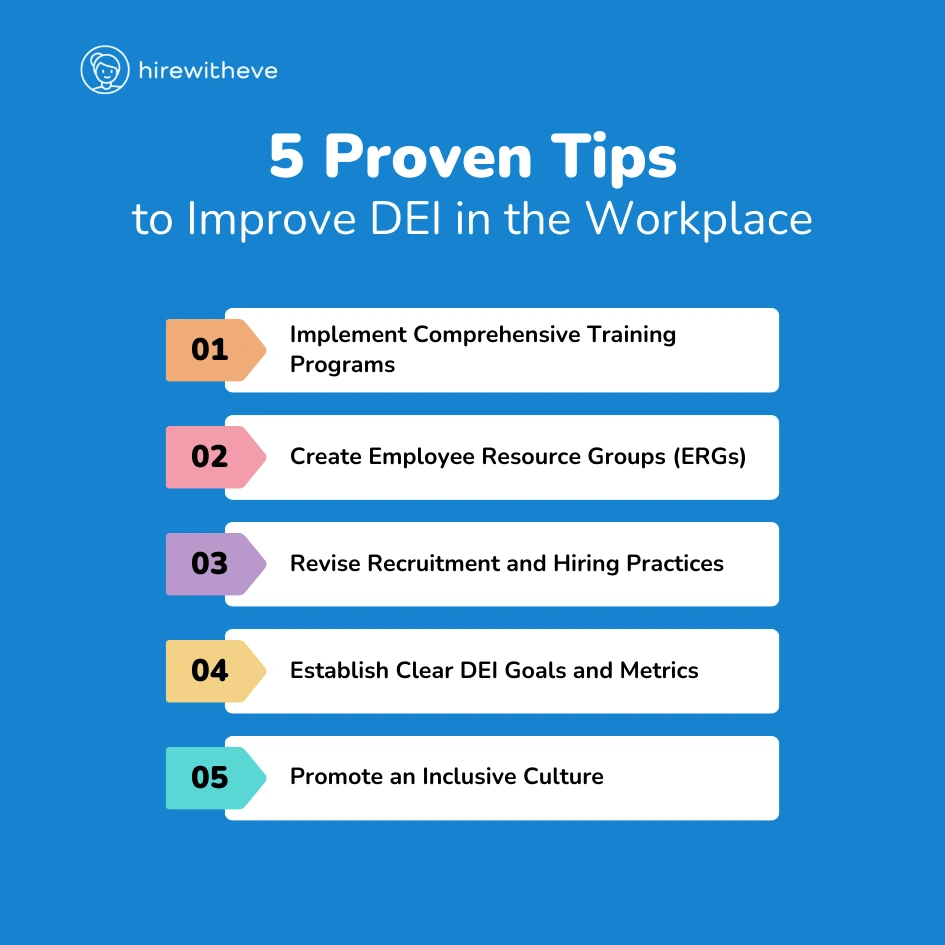What Is DEI & Why Is It Important in Hiring?

Imagine walking into a workplace where everyone looks, thinks, and acts the same — how innovative or dynamic could that be?
In today’s competitive business landscape, organizations are realizing that a one-size-fits-all approach simply doesn’t cut it anymore. That’s where the power of diversity, equity, and inclusion (DEI) comes in. When applied to hiring, DEI doesn’t just broaden the talent pool — it creates a culture that embraces different perspectives, drives innovation, and fuels business success.
So why exactly is DEI so crucial in the hiring process? Let’s dive in.
What Is DEI in the Workplace?
DEI in the workplace stands for Diversity, Equity, and Inclusion, three core principles that guide organizations in creating fair, respectful, and inclusive environments. Each element plays a crucial role in shaping a workplace that values the uniqueness of every employee while promoting equal opportunities for success.
Diversity refers to the presence of differences within a given setting. In the workplace, this can include varying dimensions such as race, gender, age, sexual orientation, religion, ethnicity, education, and more. A diverse workplace includes individuals from a wide range of backgrounds and experiences, making it richer and more dynamic.
Equity is about ensuring that everyone has access to the same opportunities, tailored to meet their unique needs. It’s different from equality, which treats everyone the same, regardless of their starting point. Equity takes into account structural barriers and works to remove them, ensuring that underrepresented or disadvantaged groups are given the tools and support they need to succeed.
Inclusion focuses on creating an environment where all employees feel welcomed, respected, and valued. It’s not enough to have diversity in numbers; inclusion ensures that diverse individuals have the opportunity to contribute meaningfully and feel like they belong in the workplace. This involves fostering open communication, mutual respect, and opportunities for all voices to be heard.
Together, DEI initiatives create a workplace that doesn’t just tolerate differences but actively seeks and celebrates them, ultimately enhancing creativity, collaboration, and overall organizational success.
What Is the Importance of DEI in Hiring?
DEI (Diversity, Equity, and Inclusion) is crucial in hiring because it goes beyond fulfilling quotas; it fundamentally enhances an organization’s ability to thrive in today’s diverse and global marketplace.
Here are five reasons why DEI is important for hiring:
Broader Talent Pool
When companies prioritize DEI, they actively seek candidates from various backgrounds, experiences, and perspectives, thereby expanding their talent pool. According to a report by McKinsey, more diverse organizations are 35% more likely to outperform their less diverse counterparts in terms of financial performance. This broader talent pool increases the likelihood of finding the right person for the role.
Enhanced Innovation and Problem-Solving
Diverse teams drive innovation by bringing different perspectives and ideas to the table. A study by Boston Consulting Group (BCG) found that companies with more diverse management teams have 19% higher revenue due to innovation. The report indicates that diverse teams are better at problem-solving and are more likely to develop new products and services.
Improved Employee Engagement and Retention
An inclusive hiring process fosters a more engaged workforce. According to research, inclusive companies are 1.7 times more likely to be innovation leaders in their market and 1.8 times more likely to report high performance. Furthermore, organizations with higher diversity and inclusion levels experience lower turnover rates, leading to cost savings and better morale.
Stronger Company Culture
A diverse workforce contributes to a vibrant and collaborative company culture. A Harvard Business Review report found that 78% of talent professionals and hiring managers say that diversity is the top priority for their organizations. Companies that embrace diversity in hiring not only improve their internal culture but also attract top talent who seek inclusive workplaces.
Business Success and Competitive Advantage
Companies that prioritize DEI are better positioned for success. A report by McKinsey found that organizations in the top quartile for gender diversity on executive teams were 25% more likely to have above-average profitability compared to those in the bottom quartile. Furthermore, those in the top quartile for ethnic diversity were 36% more likely to outperform their peers in profitability.
5 Proven Tips to Improve DEI in the Workplace
Here are five proven tips to improve diversity, equity, and inclusion (DEI) in the workplace:

Implement Comprehensive Training Programs
Training is essential for raising awareness and promoting understanding of DEI principles among employees. Conduct regular workshops and training sessions that focus on topics such as unconscious bias, cultural competency, and inclusive leadership. Providing employees with the tools and knowledge to recognize and combat biases can foster a more inclusive workplace.
Tip: Consider using a mix of formats, including online courses, interactive workshops, and guest speakers, to cater to different learning styles.
Create Employee Resource Groups (ERGs)
Establishing ERGs allows employees with shared characteristics or experiences to come together, share their perspectives, and support each other. ERGs can play a vital role in promoting a sense of belonging and community, and they can also provide valuable insights to management on the needs and concerns of diverse employees.
Tip: Encourage leadership to support ERGs by providing resources, funding, and visibility within the organization.
Revise Recruitment and Hiring Practices
Evaluate and update your recruitment and hiring processes to ensure they are equitable and inclusive. This can include using blind recruitment techniques to reduce bias, broadening your outreach to diverse talent pools, and ensuring that job descriptions are free from biased language.
Tip: Use diverse interview panels to help reduce bias in candidate evaluation and to signal to applicants that your organization values diversity.
Establish Clear DEI Goals and Metrics
Set specific, measurable DEI goals and track progress regularly. This could involve targets for diverse hiring, representation in leadership roles, or employee satisfaction ratings related to inclusion. Communicating these goals throughout the organization helps create accountability and ensures that DEI remains a priority.
Tip: Use surveys and feedback mechanisms to gather data and assess the effectiveness of your DEI initiatives.
Promote an Inclusive Culture
Creating an inclusive culture involves more than just policies — it’s about fostering an environment where all employees feel valued and respected. Encourage open communication, actively seek input from diverse voices, and celebrate cultural diversity through events, workshops, and recognition programs.
Tip: Regularly assess the workplace culture through employee feedback and adjust initiatives based on their input to ensure continuous improvement.
Hire Diverse Talent With HirewithEve.ai
At HirewithEve.ai, we empower organizations to hire diverse talent efficiently and effectively.
Our innovative platform uses AI-driven skill assessments to streamline the hiring process, cutting hiring cycles by up to 90%. Say goodbye to traditional résumés and phone screenings; we focus on pre-validated candidates who have demonstrated their abilities in real-world scenarios tailored to their actual job roles. With immersive challenges that showcase their skills, candidates experience the power of AI while you gain valuable insights into their potential.

One thought on “What Is DEI & Why Is It Important in Hiring?”